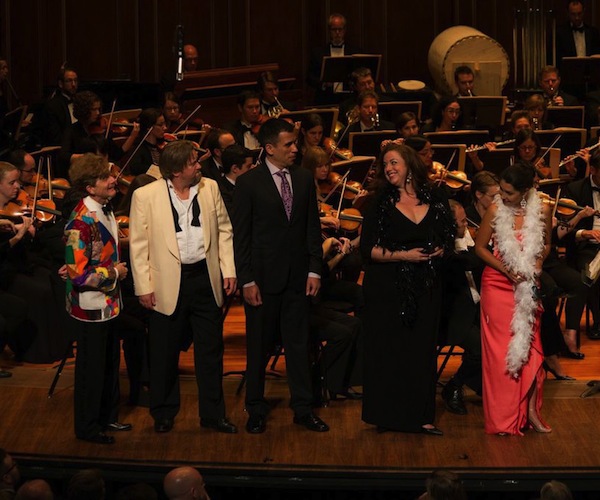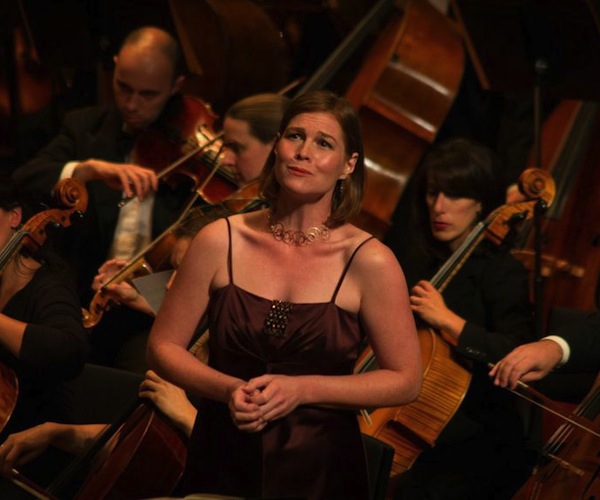Opera Review: Odyssey Opera’s “Die tote Stadt” — Setting the Bar Higher
Nothing, until the very end of the opera, is ever settled or, even, as it seems: this is psychological musical drama writ large and graphically.
By Jonathan Blumhofer
If you only know Erich Wolfgang Korngold from his acclaimed film scores (The Adventures of Robin Hood, Captain Blood, and so forth), you’re well prepared for his 1920 opera Die tote Stadt. There are the familiar, sweeping melodies played by a huge orchestra that features many late-Romantic flourishes, including plenty of wild instrumental colors.
But there are some nice surprises, too. The score is intensely theatrical and often dark. Its mood not infrequently turns on a dime. Nothing, until the very end of the opera, is ever settled or, even, as it seems: this is psychological musical drama writ large and graphically. Richard Strauss wasn’t the only composer who could describe a silver spoon with his music.
Korngold based Die tote Stadt on an 1892 horror novel by Georges Rodenbach called Bruges-la-Morte (the same book later formed the basis of Alfred Hitchcock’s Vertigo). Its plot follows a widower named Paul, whose obsession with his deceased wife, Marie, torments him and, through his behavior, pretty much everyone around him. He meets a woman who looks strikingly similar to her, named, providentially, Marietta. Paul becomes increasingly jealous and protective of her, but the tensions between his love for his dead wife and his infatuation with Marietta rise and they ultimately lead him to murder the latter, strangling her with a braid of Marie’s hair.
Here the novel ends.
But Korngold and his father, Julius (who, together, crafted the opera’s libretto), appended Rodenbach’s nihilistic resolution with a Freudian twist. After strangling Marietta, Paul wakes up. Looking around the room, he sees no body and slowly realizes that his entire relationship with Marietta had been a nightmarish reverie. Observing that “a dream of reality had obscured his dream of fantasy,” he comes to terms with Marie’s death and resolves to move on with his life and leave “the dead city.”
It’s a relatively straightforward plot, one with a moral that found ready acceptance in post-World War 1 Europe: Die tote Stadt was the most widely performed contemporary German-language opera of the 1920s. But, for a variety of reasons, it was largely absent from the stage between the 1930s and 1980s. Saturday’s performance at Jordan Hall, courtesy of Gil Rose and Odyssey Opera, was, remarkably, the opera’s much-belated Boston debut. If ever the old adage “better late than never” were appropriate to an operatic premiere, this was the occasion on which to use it.
Odyssey’s cast was uniformly strong.
As the afflicted Paul, tenor Jay Hunter Morris delivered a Herculean performance that channeled grief, ardor, jealousy, madness, and, finally, resignation and acceptance. Korngold cut the character no slack: he’s on stage for most of the opera singing music that is punishing in range and expression. Yet Morris never faltered – if anything, he seemed to gain strength as the piece proceeded – with a strong, burnished tone that easily carried over the huge orchestral forces. To the quieter moments (and there are a few, including a lovely duet with Marietta) he brought pleasing, nuanced restraint. The simple conviction with which Morris imbued Paul’s closing aria, a reprise of Marietta’s Lute Song, and nailed the high B-flat at the end, capped off an interpretation of the role that was vital and tremendously impressive.
His opposite number, soprano Meagan Miller, comfortably embodied the dual roles of the vivacious, flirty Marietta and the apparition of the dead Marie. She has a big voice that carries easily and is plenty agile, which neatly fits Korngold’s writing for the parts, and her account of the great aria, “Glück, das mir verblieb,” was serene and dulcet.
As the opera progressed and her big moments in Acts 2 and 3 rolled around, Miller, like Morris, was in fine fettle. Indeed, her combination of vocal and dramatic abilities – she’s a capable actress, even when limited by the restraints of a concert performance – allowed her to fully inhabit Marietta’s character during the harrowing first scene of Act 3; accordingly, Marietta’s apparent murder came across as about as vivid an experience of Gesamtkunstwerk as one might hope to find in such a staging.
In the small, but important, role of Brigitta, Erica Brookhyser brought warmth of tone and a sobering presence. So, too, did Weston Hurt, as Paul’s confidant, Frank, with whom Paul eventually agrees to leave Bruges. Baritone Thomas Meglioranza was another standout, with an absorbing account of Pierrot’s song in Act 2 that stole, if not the whole act, at least the extended party scene in which it appears. Jana Batty, Sara Heaton, Frank Kelley, Alan Schneider, and Jonas Budris also acquitted their parts as Marietta’s admirers and dance troupe energetically, if, at times, a bit stiffly.

Frank Kelly, Alan Schneider, Thomas Meglioranza, Jana Baty, and Sara Heaton in the Odyssey Opera production of “Die tote Stadt.” Photo: Kathy Wittman.
Unlike last year’s Rienzi, the chorus doesn’t feature too prominently in Die tote Stadt. Even so, the New World Chorale and a youth chorus drawn from the Boston City Singers and Cambridge Children’s Chorus added color and drama to their second and, especially, third act appearances as part of a religious procession outside Paul’s window.
Korngold’s orchestral writing in Die tote Stadt is nothing if not extravagant. It contains hints of Wagner, lots more of Richard Strauss, plus anticipations of Puccini (the Act 2 love duet apparently directly influenced similar duets in Turandot), and plenty of echt-Korngold touches. At many moments it is sumptuous. But the sound world of Schoenberg and Berg – snarling brass, col legno strings, ominous percussion tattoos – is never far off. And it’s this arresting juxtaposition of late-Romantic lyricism and the early-20th-century avant-garde that makes Die tote Stadt both so dramatically cogent and difficult to pull off.
Credit to Rose and the crackerjack Odyssey Orchestra for not just managing a good balance between instruments and voices, but also for never losing the feeling of magic and mystery that permeates Korngold’s involved orchestration. In lesser hands, the score – which calls for a huge percussion battery plus two harps, organ, and harmonium – might easily come off as bombastic. On Saturday it never felt that way. Quite the contrary: every exotic sonority, from the wheezing harmonium to extended sections of glassy string harmonics to the passages with the glockenspiel doubling the horn (how’s that for creative tone color?), served important expressive purposes. The orchestral playing was electrifying throughout. That it only complemented and didn’t distract from the singing is a testament to how well cast and played this production was.
That it took nearly a century to bring Die tote Stadt to Boston only emphasizes the enormous importance of institutions with vision and artistic daring like Odyssey Opera. Saturday’s was a performance at the highest level, viscerally gripping and emotionally compelling. Last year, I said that Odyssey’s Rienzi set a high bar for whatever was to come next. Well, between Die tote Stadt and their staged productions in June, Odyssey’s matched the first bar and set an even higher one. You can experience what is already one of the East Coast’s most exciting and best opera companies twice more yet this year: in a Dominick Argento double-bill in November and in Tobias Picker’s The Fantastic Mr. Fox in December. Don’t wait too long, though, or, like Saturday’s Die tote Stadt, they may well sell out.
Jonathan Blumhofer is a composer and violist who has been active in the greater Boston area since 2004. His music has received numerous awards and been performed by various ensembles, including the American Composers Orchestra, Kiev Philharmonic, Camerata Chicago, Xanthos Ensemble, and Juventas New Music Group. Since receiving his doctorate from Boston University in 2010, Jon has taught at Clark University, Worcester Polytechnic Institute, and online for the University of Phoenix, in addition to writing music criticism for the Worcester Telegram & Gazette.
Tagged: Die tote Stadt, Erich Wolfgang Korngold, Gil-Rose, Jay Hunter Morris, Meagan Miller

